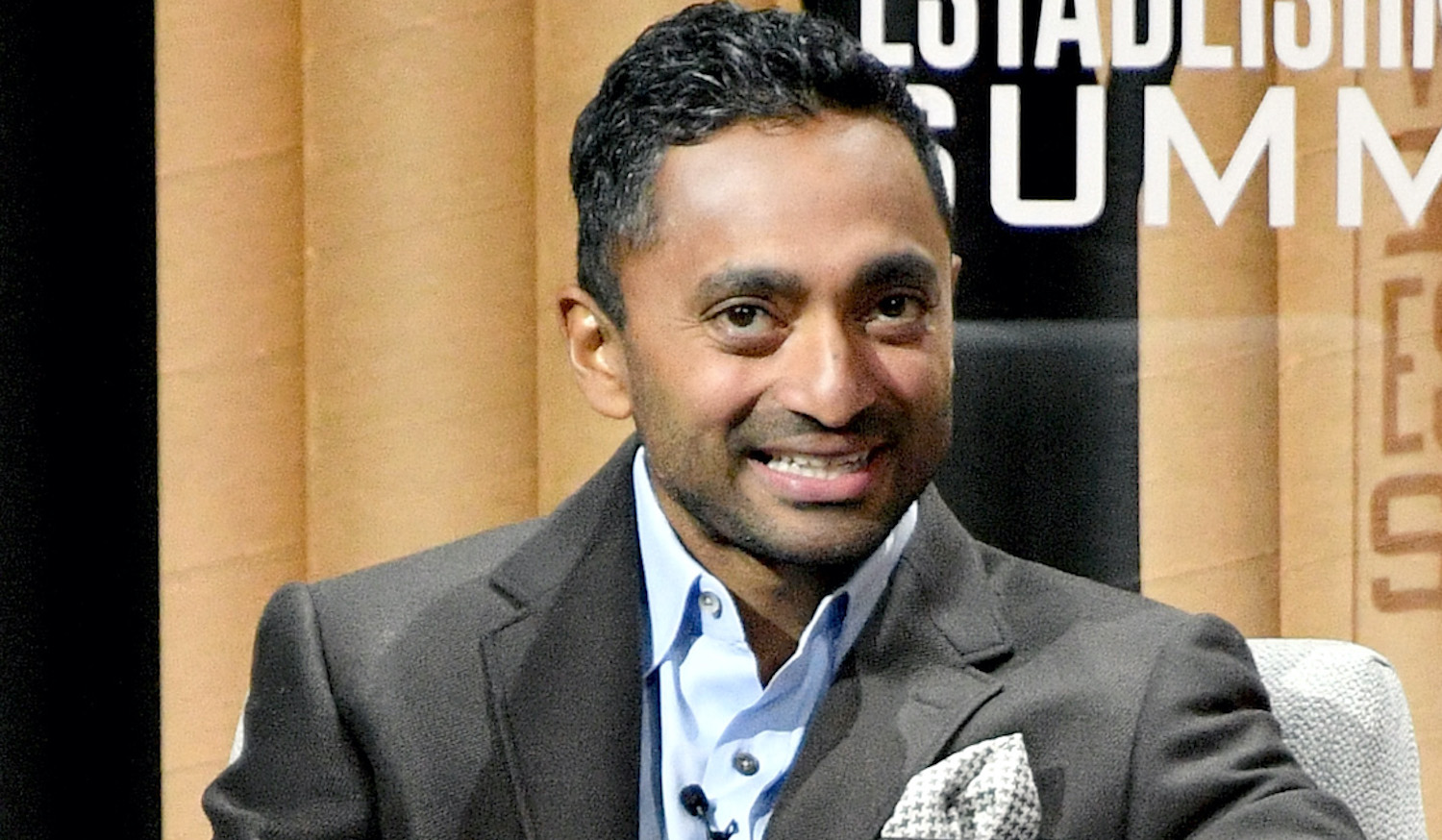A billion dollars does not make Chamath Palihapitiya any less susceptible to shooting himself in the dick on his own podcast. In this weekend's episode of All-In with Chamath, Jason, Sacks & Friedberg, Palihapitiya said "nobody cares about what's happening to the Uyghurs" in response to Jason Calacanis, one of his co-hosts, who praised Joe Biden's statements on the plight of the Uyghur people in Xinjiang. When his co-hosts pushed back, Palihapitiya clarified that he didn't have the wherewithal to concern himself with something happening in another country while the U.S. has its own internal issues.
"Not until we can take care of ourselves," he said, "will I prioritize them over us." They stayed on this topic for a few minutes, and talked about the degree to which it was OK to compare it to the Holocaust. "Every time I say that I care about the Uyghurs, I'm really just lying if I don't really care. So I'd rather just not lie to you and tell you the truth," he said, later adding, "This issue may be small data points being extrapolated in a way to create a narrative that may not be true."
Billionaire @chamath “nobody cares about what’s happening to the Uyghurs” Palihapitiya https://t.co/S3hZ584UoO pic.twitter.com/mlh2sBhGd9
— Timothy Pereira (@TimoPG) January 15, 2022
Palihapitiya's comments quickly drew criticism from prominent people across the American political spectrum. His signature brand of pomposity played a role in intensifying the shitstorm: He identifies himself as "Owner @Warriors" in his Twitter bio, even though he owns a non-controlling 10-percent interest in the team. That led to him being misidentified as the owner of the team by anti-China hawk Enes Kanter Freedom, by a former Ted Cruz staffer whose tweet really blew this up, and by the National Review, all of whom had an established line of attack on the NBA as a puppet of the Chinese government because of the Daryl Morey Hong Kong controversy of October 2019. The Warriors quickly distanced themselves from Palihapitiya and reminded everyone that he has nothing to do with the team's operations. In a short statement, he "recognized" that he came "across as lacking empathy," and clarified that he believes human rights matter. Impressively, it was neither an apology nor a clarification.
Important issues deserve nuanced discussions. Some clarifying comments: pic.twitter.com/St2jccsu05
— Chamath Palihapitiya (@chamath) January 18, 2022
How could a public-facing billionaire say something dumb enough to make Calacanis, an airhead and notorious welcher, seem astute? Is Palihapitiya really too busy solving the world's problems via capital to care about the Uyghurs, as he says?
Palihapitiya got his start in 2007 at Facebook, where he was fortunate enough to be one of the first few employees. He parlayed being in the right place at the right time (as well as his connections to Mark Zuckerberg and Peter Thiel) into a venture capital firm, Social Capital, which made a bunch of money off the rising tide of the tech industry. Establishing what is now a well-worn track record of overpromising, Palihapitiya vowed that Social Capital would embody both of the words in its name by changing the world for the better while guaranteeing returns for investors. They propose to "advance humanity by solving the world's hardest problems."
Most of those problems remain unsolved, but Social Capital did make everyone a lot of money by betting on Amazon, Tesla, and Palantir, a company which Palihapitiya would really rather not talk about. Nonetheless, his successful investing record helped him launch himself forth as a public figure, constantly generating headlines by being abrasive and brash in public and tweeting all the time. Most recently, he signal-boosted an obviously fake, antisemitic, and since-deleted screed on repressive wokeness in Silicon Valley.
Where most billionaires and big-time investors tend to have small public personas, the cornerstone of Palihapitiya's brand is that he's a bold truth-teller who will sincerely engage with the public, say controversial things, and pull back the curtain separating normal people from the levers of power. He learned, as Elon Musk did, that the market can be manipulated if sufficiently rich people just say whatever shit they want, so he leveraged his notoriety and ability to always give a great quote into a position as a financial seer. A year ago, he leapt into the GameStop stock frenzy loudly enough to boost the price ("ride or die"), then sold one day later. Shortly after proclaiming of the Robinhood founders, "these motherfuckers should go to jail," Palihapitiya directed would-be retail investors to instead use SoFi, of which he then owned 15 percent.
According to several people interviewed for a 2021 New Yorker profile of Palihapitiya, success went to his head by 2018 and he quickly alienated the staff of his fund, which imploded. Most staffers left or were unceremoniously fired, investors were furious, Palihapitiya divorced his wife Brigette Lau (Social Capital's COO) when he fell in love with an Italian pharmaceutical heiress, and then he went on Kara Swisher's podcast a year later to announce the fund's new direction.
"So to all the people that worked for me and whose money I took, you’re fucking welcome," he said on Recode Decode. "We did the job we were asked to do. But just like Michael Jordan had a decision to retire and go play baseball, I chose to retire and go play baseball. Now, I may come back to basketball, but this is my decision. I am not your slave. I just want to be clear. My skin color 200 years ago may have gotten you confused, but I am not your slave."
The new direction for Social Capital was getting into SPACs. Palihapitiya brought on the resurgence of the SPAC in 2020 after his merger with Virgin Galactic paid off. SPAC investments remain a losing bet for normal investors, and Palihapitiya's SPAC offerings in particular have been outperformed by a SPAC index fund and by the S&P 500, though this has only been a problem for regular people, not him. One perk of a SPAC merger is that the founders typically get a 20 percent cut of the stock, which means they will make money no matter what, and they have an incentive to dupe the general public into pumping those shares.
The laxer rules on SPACs created the conditions for something like the Clover Health SPAC fiasco, in which Palihapitiya made a ton of money to help take the health insurance company public. Five months after they reached the market, a notorious short-seller revealed how the company's signature innovation was bullshit, and also publicized that it was under an active DOJ investigation. Because Clover went to market via a SPAC, none of this was made public until after Palihapitiya had convinced retail investors to bet their money on a lame horse. Palihapitiya intermittently managed to pump the limp stock, now purely a meme stock, past its initial offering price of $10 by boasting about his ongoing investment in the company. As of publication, the stock is $2.80, the lowest it's ever been. And after a frothy two years, the SPAC market has cooled off.
Palihapitiya's politics mostly boil down to him thinking he can solve the world's problems because he is rich. He's donated to a bunch of liberal candidates for office and also Ted Cruz, and gave $100,000 to the campaign to recall Gavin Newsom. He's also part of a group of rich guys who do not live in San Francisco but want to get San Francisco's district attorney recalled. As every profile of Palihapitiya notes, his public persona is riddled with contradictions, which can only be squared by remembering that his only true aim is to boost his own persona and portfolio. It's funny, then, that his latest turn into the public consciousness stems from him uniting people with disparate ideologies, in the common cause of calling him an idiot.





